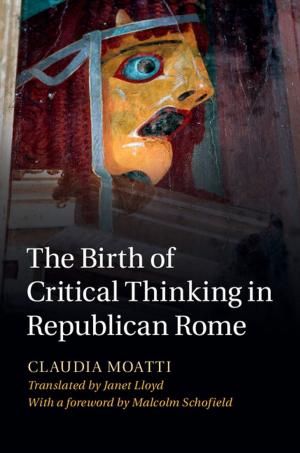The Epic Gaze
Vision, Gender and Narrative in Ancient Epic
Fiction & Literature, Literary Theory & Criticism, Ancient & Classical, Nonfiction, History| Author: | Helen Lovatt | ISBN: | 9781107272422 |
| Publisher: | Cambridge University Press | Publication: | June 27, 2013 |
| Imprint: | Cambridge University Press | Language: | English |
| Author: | Helen Lovatt |
| ISBN: | 9781107272422 |
| Publisher: | Cambridge University Press |
| Publication: | June 27, 2013 |
| Imprint: | Cambridge University Press |
| Language: | English |
The epic genre has at its heart a fascination with the horror of viewing death. Epic heroes have active visual power, yet become objects, turned into monuments, watched by two main audiences: the gods above and the women on the sidelines. This stimulating, ambitious study investigates the theme of vision in Greek and Latin epic from Homer to Nonnus, bringing the edges of epic into dialogue with celebrated moments (the visual confrontation of Hector and Achilles, the failure of Turnus' gaze), revealing epic as massive assertion of authority and fractured representation. Helen Lovatt demonstrates the complexity of epic constructions of gender: from Apollonius' Medea toppling Talos with her eyes to Parthenopaeus as object of desire. She discusses mortals appropriating the divine gaze, prophets as both penetrative viewers and rape victims, explores the divine authority of epic ecphrasis, and exposes the way that heroic bodies are fragmented and fetishised.
The epic genre has at its heart a fascination with the horror of viewing death. Epic heroes have active visual power, yet become objects, turned into monuments, watched by two main audiences: the gods above and the women on the sidelines. This stimulating, ambitious study investigates the theme of vision in Greek and Latin epic from Homer to Nonnus, bringing the edges of epic into dialogue with celebrated moments (the visual confrontation of Hector and Achilles, the failure of Turnus' gaze), revealing epic as massive assertion of authority and fractured representation. Helen Lovatt demonstrates the complexity of epic constructions of gender: from Apollonius' Medea toppling Talos with her eyes to Parthenopaeus as object of desire. She discusses mortals appropriating the divine gaze, prophets as both penetrative viewers and rape victims, explores the divine authority of epic ecphrasis, and exposes the way that heroic bodies are fragmented and fetishised.















